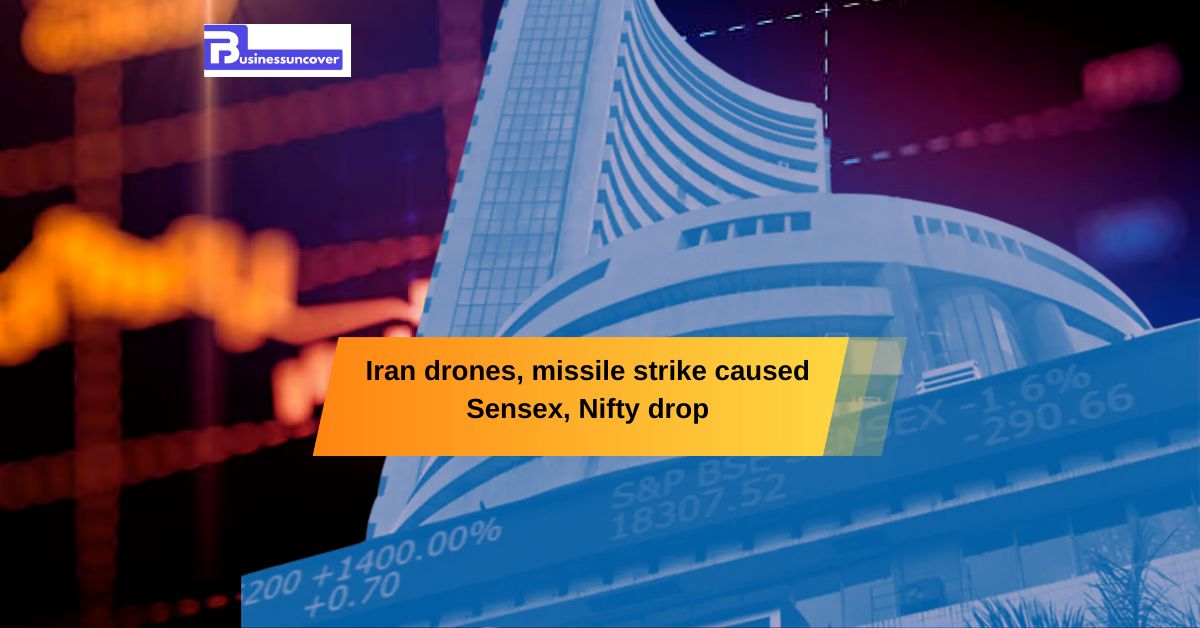Iran drones: As soon as the opening bell rang on Monday morning, the Sensex, Nifty, and other important sectoral indices fell sharply. This was due to concerns about whether the market should factor in any rate cuts this year from Iran’s drone strike on Israel and the latest statistics on US inflation. Near-term negative drivers for stocks include sticky inflation, pricier oil amid geopolitical tensions, and a stronger dollar, according to analysts. The upcoming elections in India and worries about the tax treaty between India and Mauritius could exacerbate the volatility, they warned. Iran drones, missile strike caused Sensex, Nifty drop, along with four other market reasons
Iran launched some 300 missiles and drones over the weekend in retaliation for Israel’s strike on its consulate in Syria. Although Israel claimed to have shot down 99% of Iran’s drones and missiles with no casualties, Prime Minister Benjamin Netanyahu’s military council was apparently in favor of “hitting back.” There are concerns that if it happens, oil, which is currently trading at about $90 per barrel, will cause global inflation to rise. US banks have already issued warnings about expensive deposits that could reduce their interest revenue by 2024.
The BSE Sensex was up 569.05 points, or 0.77 percent, at 73,675.85 at 9:17 a.m. Nifty was down 181.75 points, or 0.81 percent, at 22,337.65. Tata Motors dropped 2.64 percent to Rs 991.65 among Nifty companies. Over 2% each was lost by BPCL, Adani Enterprises, Tata Steel, and Coal India. Shriram Finance, Tata Consumer, Power Grid, NTPC, State Bank of India, and others had 1.7% to 2% declines. The market dropped today for the following five reasons:
Oil costs
It was inevitable that Iran would respond, and there were worries that the developing crisis would cause oil prices to spike. However, as of right now, West Texas Intermediate (WTI) futures for May delivery were down 33 cents, or 0.4 percent, at $85.33 a barrel, while Brent futures for June delivery were down 20 cents, or 0.2 percent, to $90.25 a barrel. The market is concerned that the flow of oil through the Middle East could be disrupted by a wider regional conflict. Investors were relieved that the Israeli side suffered little damage from the missile attacks.
“The United States has stayed out of the Israel-Iran dispute directly. If tensions in the area continue to rise, this might upset the world’s oil supply and drive up oil prices once again. The trading session for crude oil today is expected to remain volatile. Crude oil is expected to find support between $84.50 and 83.90 and resistance between $85.90 and 86.60, according to Rahul Kalantri, VP of Commodities at Mehta Equities.
US inflation and dollar growth
Asian stocks may struggle in the near future due to a combination of factors including the threat of sticky US inflation, which increases the likelihood of a hawkish repricing, higher rates and yields, higher oil prices (amid growing geopolitical uncertainty in the Middle East), and a stronger dollar, according to Nomura India.
“We do not believe this is the beginning of a lasting decline in stocks, though, unless geopolitical tensions considerably escalate and result in persistently high oil prices. This is due to three factors. Firstly, stocks have historically shown a tendency to see past initial knee-jerk negative swings in response to regional geopolitical tensions,” it stated.
It was observed that oil peaked within two weeks of the Russia-Ukraine crisis in February 2022 and the Hamas attack on Israel in October 2023, before stabilizing.
India-Mauritius fiscal agreement
In order to prevent abuse for the purpose of tax evasion or avoidance, India modified its Double Taxation Avoidance Agreement (DTAA) with Mauritius. The Principal objective Test (PPT), which basically states that tax benefits under the treaty will not apply if it is determined that achieving that duty benefit was the primary objective of any transaction or arrangement, is a new addition to the modified agreement.
“Several factors will influence markets today, including the escalating Middle East conflict, proposed modifications to the India-Mauritius tax treaty, and the higher-than-expected US inflation rate,” according to V K Vijayakumar, Chief Investment Strategist at Geojit Financial Services.
2024 Lok Sabha elections
There will be 18 General Elections in India in the next six weeks, from April 19 to June 1. The Lok Sabha elections are scheduled to take place over 44 days in seven parts, with results expected to be declared by June 4. The elections took place in April and May of 2019, and the results were declared on May 23 of the same year.
It is hoped that the BJP would win three more terms in office. However, unpredictability remains ahead of the most important elections in history.
“The general elections 2024 BJP manifesto reads strongly in favor of Indian stocks. With a focus on financial macro stability, the Party maintains consistency in its reform platform and is poised to win big in the upcoming polls. Textiles and pharmaceutical API are likely winners, while capital goods (railways/defense), housing/mortgages, tourism, and aviation are the direct benefactors. Emkay Global stated, “We continue to have a favorable medium-term outlook on the markets, with a preference for the manufacturing and infrastructure sectors and an emphasis on SMIDs.
(Disclaimer: This is not intended to be used as investment advice; Businessuncover merely offers stock market news for informative reasons. Before making any investing decisions, readers are advised to speak with a licensed financial advisor.)







